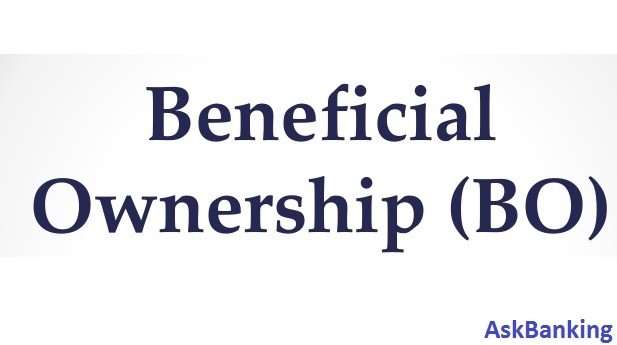
Explained – Who is a Beneficial Owner (BO) in the Banking Accounts – As per the guidelines by Prevention of Money-Laundering Act, 2002 and the Prevention of Money-Laundering (Maintenance of Records) Rules, 2005, every Regulated Entities (RE) like banks, insurance companies, stock brokerage firms etc. require to maintain the customer identification procedures while undertaking a transaction either by establishing an account-based relationship or otherwise and monitor their transactions. In the cases of a company, firm, trust, society or in a partnership firm or in unincorporated association or body of individuals, the beneficial owner is identified by the regulated entities which are explained below.
Beneficial Owner/s in Company Accounts
a. Where the customer is a company, the beneficial owner is the natural person(s), who, whether acting alone or together, or through one or more juridical persons, has/have a controlling ownership interest or who exercise control through other means.
Explanation- For the purpose of this sub-clause-
- Controlling ownership interest” means ownership of/entitlement to more than 25 per cent of the shares or capital or profits of the company.
- Control” shall include the right to appoint majority of the directors or to control the management or policy decisions including by virtue of their shareholding or management rights or shareholders agreements or voting agreements.
Also Read – Guidelines – Opening of Current Accounts With Bank
Beneficial Owner/s in Partnership Firms
Where the customer is a partnership firm, the beneficial owner is the natural person(s), who, whether acting alone or together, or through one or more juridical person, has/have ownership of/entitlement to more than 15 per cent of capital or profits of the partnership.
Beneficial Owner/s in Associations/Society
Where the customer is an unincorporated association or body of individuals, the beneficial owner is the natural person(s), who, whether acting alone or together, or through one or more juridical person, has/have ownership of/entitlement to more than 15 per cent of the property or capital or profits of the unincorporated association or body of individuals.
Explanation: Term ‘body of individuals’ includes societies. Where no natural person is identified under (a), (b) or (c) above, the beneficial owner is the relevant natural person who holds the position of senior managing official.
Beneficial Owner/s in Trust Accounts
Where the customer is a trust, the identification of beneficial owner(s) shall include identification of the author of the trust, the trustee, the beneficiaries with 15% or more interest in the trust and any other natural person exercising ultimate effective control over the trust through a chain of control or ownership.
Certified Copy – Obtaining a certified copy by the RE shall mean comparing the copy of the proof of possession of Aadhaar number where offline verification cannot be carried out or officially valid document so produced by the customer with the original and recording the same on the copy by the authorised officer of the RE as per the provisions contained in the Act.
Provided that in case of Non-Resident Indians (NRIs) and Persons of Indian Origin (PIOs), as defined in Foreign Exchange Management (Deposit) Regulations, 2016 {FEMA 5(R)}, alternatively, the original certified copy, certified by any one of the following, may be obtained:
- authorized officials of overseas branches of Scheduled Commercial Banks registered in India,
- branches of overseas banks with whom Indian banks have relationships,
- Notary Public abroad,
- Court Magistrate,
- Judge,
- Indian Embassy/Consulate General in the country where the non-resident customer resides.
Central KYC Records Registry” (CKYCR) means an entity defined under Rule 2(1) of the Rules, to receive, store, safeguard and retrieve the KYC records in digital form of a customer.
Also Read – Tutorial – How To Report Bank’s Fraud Cases to CBI ?
“Designated Director” means a person designated by the RE to ensure overall compliance with the obligations imposed under chapter IV of the PML Act and the Rules and shall include:
- the Managing Director or a whole-time Director, duly authorized by the Board of Directors, if the RE is a company,
- the Managing Partner, if the RE is a partnership firm,
- the Proprietor, if the RE is a proprietorship concern,
- the Managing Trustee, if the RE is a trust,
- a person or individual, as the case may be, who controls and manages the affairs of the RE, if the RE is an unincorporated association or a body of individuals, and
- a person who holds the position of senior management or equivalent designated as a ‘Designated Director’ in respect of Cooperative Banks and Regional Rural Banks.
Explanation by RBI – For the purpose of this clause, the terms “Managing Director” and “Whole-time Director” shall have the meaning assigned to them in the Companies Act, 2013.











Do You Want To Say Something :